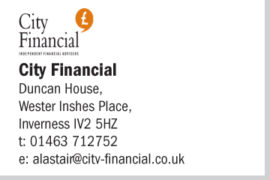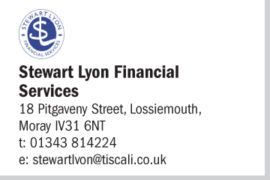INDEPENDENT FINANCIAL ADVICE ON MONEY MATTERS AROUND THE HIGHLANDS, ISLANDS & MORAY
Financial planning is something that is very easy to put off and never get round to it. Often it can be overwhelming and hard to know where to start. The six steps shown here should put you in a solid position to achieve your goals and objectives.
Step 1. Have an emergency fund
This is a store of capital that you can access fairly quickly in the case of an unforeseen circumstance such as a loss of job or a car repair. It can be very reassuring to know that you have this in place.
The amount to set aside will be different for everyone but as a rule of thumb, at least three month’s salary is often suggested.
Step 2. Protect yourself and your family
Through various types of insurance policies. There are two main categories of policies that you can take out:
- Insurances that you might claim on more frequently but that have a low-ish impact on your life – e.g. – House insurance
- Insurances for areas that would have a much larger impact on your life – such as
health, life and income protection
When you are considering what you should have in place you need to think about who also relies on your income, other than yourself. Unfortunately this is often only thought about after the event.
Step 3. Deal with debt
Especially unsecured debt. Review it. Clear it. Look to transfer it. Avoiding it in the first place would be even better.
Step 4. Save and invest well
Don’t hold too much in cash– this is an inefficient type of investment for long term savings, especially when you take into account inflation. Inflation is running at a scary 5.1% as at December 2021, which will heavily erode its value.
Think about asset allocation. You may need to take a longer-term perspective and accept a level of volatility.
Lastly – the earlier you start the better.
Step 5. Keep everything in good order
Consolidate – the advent of platforms has helped people consolidate investments,
pensions and other assets. Check before you do consolidate that any older policies don’t have preferential terms or clauses that you might lose before you consolidate them.
Make sure you have a will in place and that it is up to date. It makes sense to have a Power of Attorney in place also, especially if you have dependants. Consider putting in place a Power of Attorney – this is a good idea even if you are young and in good health.
Tax – consider elements of tax planning, make use of tax reliefs on pension contributions, ISAs, inheritance tax etc.
Step 6. Have a plan, review it regularly and take advice
- Be aware – understand your spending, saving and the financial products you have.
- When spending, consider need, want and love – happiness is not best measured by what you have
- Have a plan which correlates with your life goals
Envision the life that you want to lead, if you had no debts, or financial obligations,
how would you spend your time?
With the assistance of an Independent financial adviser you can walk through each of these steps in a clear and concise manner. By kicking the tyres of the six steps once a year you should be in a good place to achieve your goals and objectives.
Next month’s topic is on End of Financial Planning
Contact your local Independent Financial Advisers for a no obligation initial discussion – Click to visit their website:






